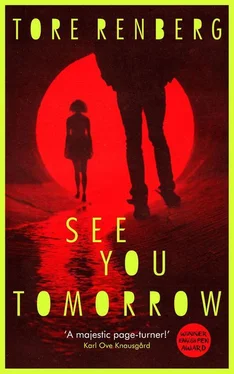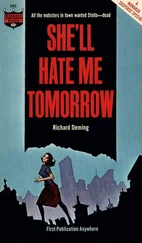There was a moped in front of the house. An old Suzuki, red with a black leather seat, the kind people drove when Jan Inge was small.
His attention shifted to the front door.
There was a boy standing there.
‘What is it?’ Cecilie whispered.
‘I don’t know,’ Jan Inge whispered back.
‘Who’s out there?’ Rudi said in a low voice.
‘I don’t know,’ Jan Inge replied in a hushed tone.
‘What does he want with us?’ whispered Cecilie.
Jan Inge shook his head resignedly. ‘More changes, maybe,’ he whispered.
‘Looks that way, headmaster,’ Rudi sighed, as the doorbell rang. The three of them walked slowly in line out into the hall. Jan Inge opened the door.
A beautiful boy with deep-set eyes, wearing a leather jacket, stood before them. He looked gaunt and tired. He did not look like he had slept in several days. He held a black crash helmet in his hands.
‘Hi,’ the boy said, with a quick nod.
‘Hi,’ Jan Inge said. ‘What do you want?’
The boy looked at them, ‘I know who you lot are,’ he said.
Jan Inge cleared his throat. ‘Okay?’
Oh Jesus, he thought, are we going to have to open up the grave again?
The boy tossed the moped helmet from one hand to the other.
‘You have something I want,’ he said, ‘and I have something that none of you want.’
Rudi took a step towards the boy.
‘Is it the internet you’re on about?’ he said sternly.
Jan Inge put a hand on Rudi’s shoulder, but he paid no heed. ‘Listen,’ he said, ‘you can’t go round knocking on strangers’ doors talking like that, you get me? One more word and I’ll get my baseball bat and clobber you with it. Youhearmebirdseed?’
The boy remained unflustered. ‘You have something I want,’ he repeated.
‘What exactly do you mean?’ Jan Inge asked.
‘I want in,’ Daniel said, ‘in to where you lot are.’
‘Jesus,’ Jan Inge said. ‘What are you talking about?’
‘I know what you’ve done,’ the boy whispered and stared right into Jan Inge’s eyes.
‘Excuse me?’
‘Pål Fagerland,’ the boy said.
Oh no, Jan Inge thought, clenching his teeth as hard as he could, do I have to get the shotgun, do I have to murder again?
‘I don’t need any more changes right now,’ Cecilie whispered while she looked over the unusually beautiful boy with his deepset, hungry eyes, his bright mouth, sharply defined jaw and long-fingered hands. Then she brought her hand to her stomach to safeguard her child against this terrible, ineluctable world it would one day be part of.
See You Tomorrow asked for hard work, patience and a lot of research, and I have been fortunate to have the generosity and devotion of intelligent and empathic people during these six years of writing.
Thanks to my editor Kari Joynt and everyone at Forlaget Oktober in Oslo. Thanks to Aschehoug Agency for their work with my books abroad. Thanks to Karen Sullivan and Gary Pulsifer at Arcadia, Amélie Burchell and everyone at Faber Factory and Faber Factory Plus, my translator Séan Kinsella, and all my foreign publishers and translators for making this happen around the world. I am grateful for the generous support of Norla and the Norwegian Embassy, who have made so much of this possible.
My love goes out to my lifelong friend and internet-dude, Kristian Fjermestad, and thanks to my designer Asbjørn Jensen, the directors Stian Kristiansen og Arild Andresen, and Motlys and Yngve Sæther for making films of my books.
For invaluable information, I thank investigator Eldfrid Vestbø at Stavanger Police Station, lawyer Anne Kroken, inmates and workers at Åna Prison, pupils and teachers at Gosen School, and everyone else who so generously shared and listened.
A big round of applause to my colleagues: Karl Ove Knausgård for years of inspiring friendship and reading, Jo Nesbø for advice and interesting talks, Frode Grytten for so much support and joy, and Tønes and Janove Ottesen for all those great songs.
It often feels as if my energy comes from listening to music. I’d like to take the opportunity to thank a handful of artists who have meant so much over the years: Nick Cave, Jarvis Cocker, David Bowie, Ray Davies, The Flaming Lips, David Sylvian, Morrissey, Pet Shop Boys, Tom Waits, Kate Bush, Duran Duran, Phil Collins, Bob Hund, Depeche Mode, XTC.
Without family, there would be no great books. Thanks to my lovely mother, Mirjam Elisabeth Renberg, to my beautiful children, Petra and Allan, to all the cowboys and Indians in my family, and to my shimmering girlfriend, Hilde.
First and foremost, thanks to my great readers. You are the reason.
(And thanks to the Tjensvoll Gang. You sure did frighten us back then. You wrote this.)
Tore Renberg is a multi-award-winning author, who has distinguished himself as a literary critic and TV host for the Norwegian Broadcasting Corporation. A student of philosophy and literature at the University of Bergen, where he met lifelong friend Karl Ove Knausgård, he first achieved major success at the age of 23, with the short-story collection Sleeping Triangle and then the novel The Man Who Loved Yngve, which was made into a major motion picture. This was followed by four further novels with the same protagonist, which sold over 400,000 copies in Norway. In addition to his work as an essayist and novelist, Tore has played in several bands, and written for the screen and the theatre. His work has been translated into 15 languages.
Seán Kinsella is from Dublin. He has previously translated works by, amongst others, Kjell Askildsen and Frode Grytten into English. His translation of Stig Sæterbakken´s Through the Night , was long-listed for the BTBA 2014. He lives in Norway.












